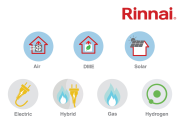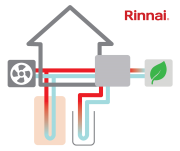Commercial heating and hot water provision sectors currently exist in a state of uncertainty in relation to customer costs, outside investment, future direction and implementation of national legislation that encourages decarbonisation. Further turbulence will be exacerbated by the certainty of a UK general election and a possible change of government which could signal a redrafting of national energy policy.
Over a year the current UK government and opposition parties have reneged on several ecological pledges and appears to have lost momentum in implementing national decarbonisation. Shifts in policy has resulted in creating confusion for investors inside the UK energy market. And, in the meantime, life goes on as the population still requires heating and hot water provision, through new build and replacement. UK national energy acquisition, property regulations and UK gas boiler manufacture are areas of the UK energy market that have experienced recent reversals in terms of active or in-coming legislation.
One of the UK’s biggest insurance company’s – Aviva – was quoted in The Times as saying: “the government increasingly focuses on short-term energy security over long-term sustainability.”

As European and American big business have embraced large renewable projects, UK political indecision, ever rising global energy costs and the question of supply security has led to a lack of investment within large scale UK renewable projects. Also published in the same Times article as above, Aviva believe that “the recent dilution in government net zero targets is an even bigger challenge and creates uncertainty.”
The Energy Transition Readiness Index 2023 is a measurement of a regions ability to transition towards NetZero. It is a report compiled for potential investors to evaluate a country’s viability towards profiteering from renewable electricity. The latest report believes that investors will only be attracted towards UK projects if they can observe clear and succinct governance as well as regulatory stability. Presently there is not enough evidence of either to entice outside capital investment.
The UK government has had to offer £800 million to support new offshore wind farms as the amount of capital incentives offered in the previous round of CfD offshore wind auctions failed to attract a single bid.
Concurrent with this is the MEES situation. These are regulations which ensure that all buildings are in ownership of an EPC (Energy Performance Certificate) with an “E” as its lowest rating. Further amendments drafted in 2021 aimed for Minimum Energy Efficiency Standards to be raised to “D” in 2025 and “C” in 2030.
This would have meant that landlords who privately own and rent property across the UK would have had to legally meet energy efficiency standards to continue renting to customers.
However, the UK government has scrapped these plans as implementation would have meant extra costs to both landlord and property rental customer. A redrafting of MEES regulations is expected and will likely impose clean energy standards on rented property.
 Also, there is the ‘ban’ on gas boilers being installed at off-grid sites has been lengthened from 2026 to 2035. The “boiler tax” has also been delayed. This proposed tax system would have been imposed on gas boiler manufacturers that failed to substitute several percentage points of boiler sales for heat pump sales, resulting in a £3,000 fine for each missed installation.
Also, there is the ‘ban’ on gas boilers being installed at off-grid sites has been lengthened from 2026 to 2035. The “boiler tax” has also been delayed. This proposed tax system would have been imposed on gas boiler manufacturers that failed to substitute several percentage points of boiler sales for heat pump sales, resulting in a £3,000 fine for each missed installation.
A potential new government later this year could also introduce further change to the UK energy market by way of a new direction in policy and cost. As one observer said about the current parlous state of play in the UK now as being akin to ‘all the runners are lined up for a sprint start to a very quick finish line’.
Specifiers, contractors, installers and UK property owners should seek manufacturers of hot water and heating products that can offer a wide range of appliances in the variety of energy vectors to produce low carbon solutions for all residential, industrial and commercial properties. It is likely that the UK will hold on to natural gas for the moment whilst purposely manoeuvring different energies and production into play on a mass scale – be they wind, solar, DME, BioLPG.